‘Tradwives’ are big business online. But are they peddling dangerous stereotypes or just misunderstood?
Nara Smith is making a peanut butter and jam sandwich. It should be ready in a couple of hours.
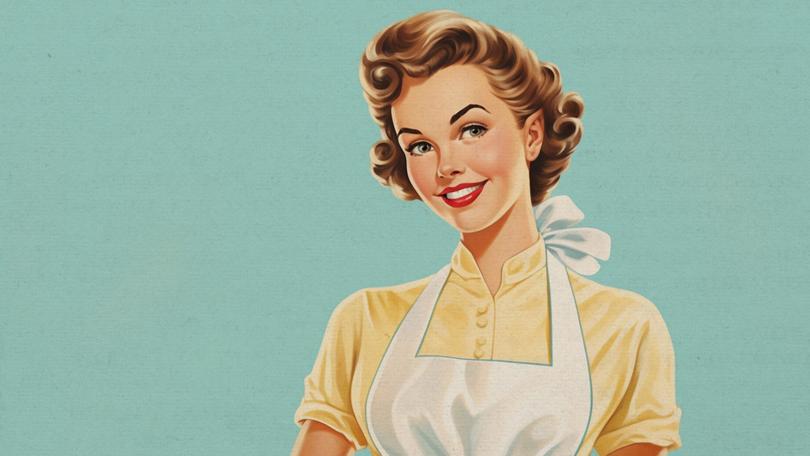
Nara Smith is making a peanut butter and jam sandwich.
Nothing unusual in that: just a woman in her kitchen, wearing a feather-fringed black peignoir and full-make-up, baking fresh bread and making her own jam and peanut butter from scratch in order to procure a sandwich for her child. For some reason.
“This morning my toddler stumbled into my room and her first words were ‘PB&J’ so that’s exactly what I got started on,” Ms Smith tells her four million TikTok viewers before beginning the multiple hours-long process of making a snack.
Sign up to The Nightly's newsletters.
Get the first look at the digital newspaper, curated daily stories and breaking headlines delivered to your inbox.
By continuing you agree to our Terms and Privacy Policy.The Mormon model has amassed a social media following for her videos offering a (highly stylised) insight into her life in Los Angeles, where she lives with her model husband, Lucky Blue Smith, and their two kids.
It’s unclear whether Ms Smith’s viewers are there for her recipe ideas (lasagne in just four short hours, let’s start by making the mozzarella!) the glamour (she habitually appears in gorgeous designer outfits) or for the soothing effect of her unconventional, borderline post-lobotomy way of speaking.

Judging by the comments her videos attract, her fans can be divided into those who view them as light entertainment, those who think she’s in on the joke and those who are there for the ASMR. There’s also a strong cohort of hate-watchers, who accuse her of everything from promoting problematic gender roles to being a Mormon psyop.
Smith is one of the stars of the “tradwife” social media trend.
Short for “traditional wife”, tradwives are women who promote themselves as a 1950s feminine ideal, with none of the unpleasant reality of that era, when Australian women could not apply for a mortgage, drink in a public bar or object to being raped by their husbands.
Tradwives are big on TikTok and Instagram.
They are also, depending on your point of view, either harmless fun, a welcome return to old-fashioned values or an alt-right, offshoot of the same toxic manosphere that made accused rapist and sex trafficker Andrew Tate internet famous.
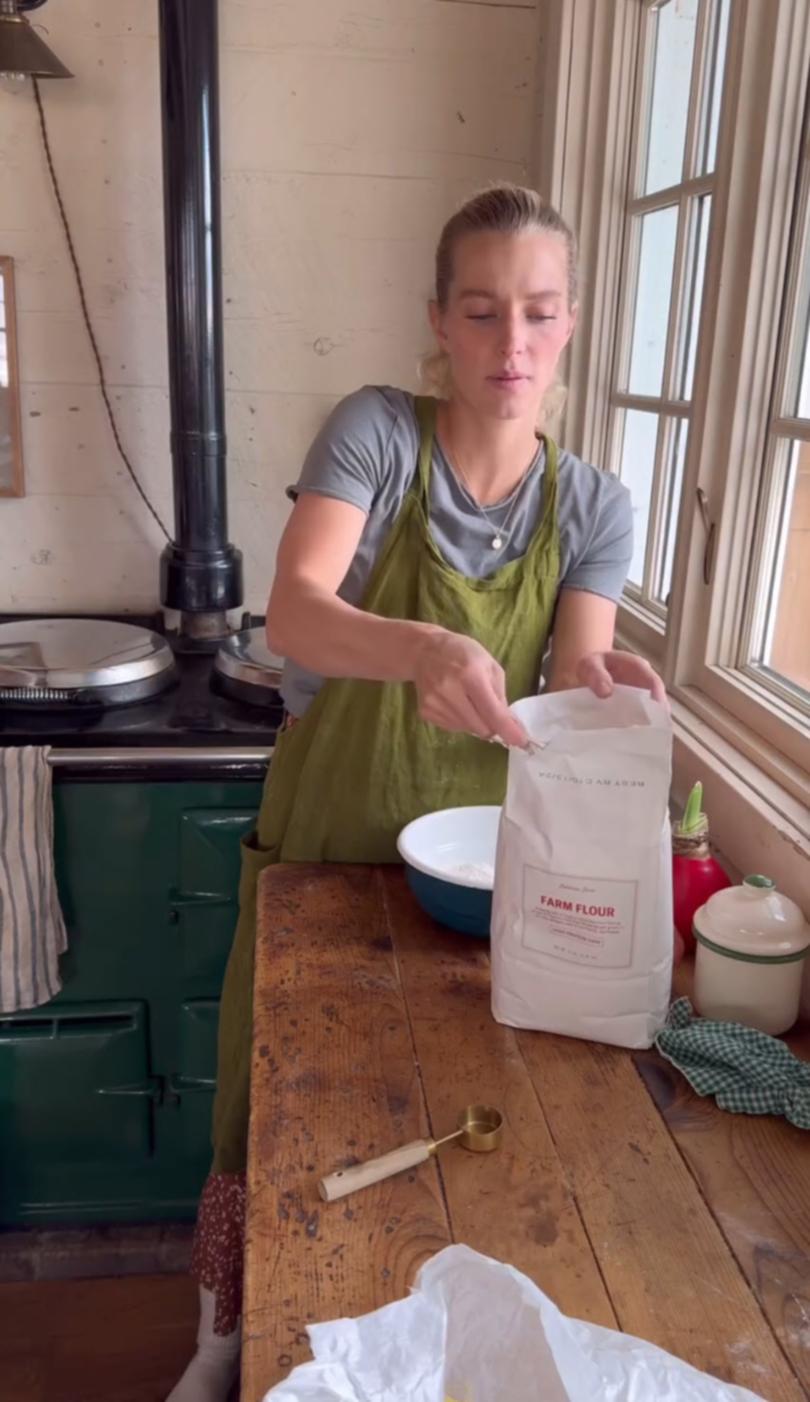
What are tradwives?
The trad wife formula goes something like this.
The woman is a stay-at-home wife or girlfriend.
Mostly they are mothers.
Often they are beautiful.
Usually, they are white. Ms Smith, who has South African and German heritage, is an exception.
A number espouse Christian beliefs and conservative political views.
They post videos under hashtags like #tradwives #homemaker and #SAHG in which they appear to derive satisfaction from performing domestic duties, often while dressed in a hyper-feminine style.
The tradwife trend emerged as early as 2015 but it didn’t come to mainstream attention until about 2020. It arguably has its roots in a certain kind of celebrity homemaker persona that has, at times, been adopted by everyone from Blake Lively to Jessica Alba — the latter has parlayed her domestic goddess persona into a multi-million-dollar baby retail empire.
Ms Smith’s schtick is about slow — sometimes very slow — cooking while looking like she’s ready for a modelling shoot, but other successful tradwives have their own brand.
Australian tradwife Jasmine Dinis is more likely to be found tending to the garden or cooking with her daughter. She also preaches in favour of submitting to one’s husband, avoiding tap water and seed oils and practices an “ancestral diet”, having renounced veganism.
“In a world full of women teaching their children that their only goal is to go to university, get a good job and make money, I’m teaching my little girl to live a slow life, to be a biblical woman that wants a husband & a beautiful family that she can serve daily,” reads the caption on her most controversial TikTok video.
Gwen the Milkmaid, real name Gwen Swinarton, is a TikTok tradwife who made the jump from the decidedly more adult-themed social media site OnlyFans, apparently after a religious conversion.
These days she films herself making sourdough in her spotless kitchen or picking flowers in the garden, invariably wearing a floaty floral dress.
“Once upon a time, I was a man-hating feminist,” she says, in one video. “Now I’m happily spending hours in the kitchen making my husband whatever he wants for dinner.”
And, in another: “Is it just me, or are most women today completely blind to the fact that the promiscuous lifestyle, p*rn, multiple partners, birth control pill, premarital s*x and everything else the world glorifies today is actually destroying us?”

They can be controversial
In 2024 the most famous of the internet’s tradwives is probably Hannah Neeleman, who embodies the good, the bad and the controversial of the subculture.
Anyone who has followed Ms Neeleman’s farming efforts on what is known as Ballerina Farm in Utah will likely know her for two things: competing in a beauty pageant two weeks after giving birth to her eighth child and owning a $US30,000 stove.
Ms Neeleman, who has 10m-plus followers across TikTok and Instagram, lives what might appear like a simple life with her husband Daniel and their eight children. The couple are ranchers in Utah and Ms Neeleman spends her days milking cows, collecting eggs and baking bread.
But the couple are also reportedly heirs to a billion-dollar aviation fortune – a fact that only became public knowledge when sharp-eyed viewers noticed the wildly expensive Aga stove lurking in frame.
The revelation fuelled a fiery online debate about whether the couple were selling a false ideal of farming life and the viability of living off the land with only hard work and a wardrobe of tasteful neutrals, without acknowledging their billion-dollar safety net.
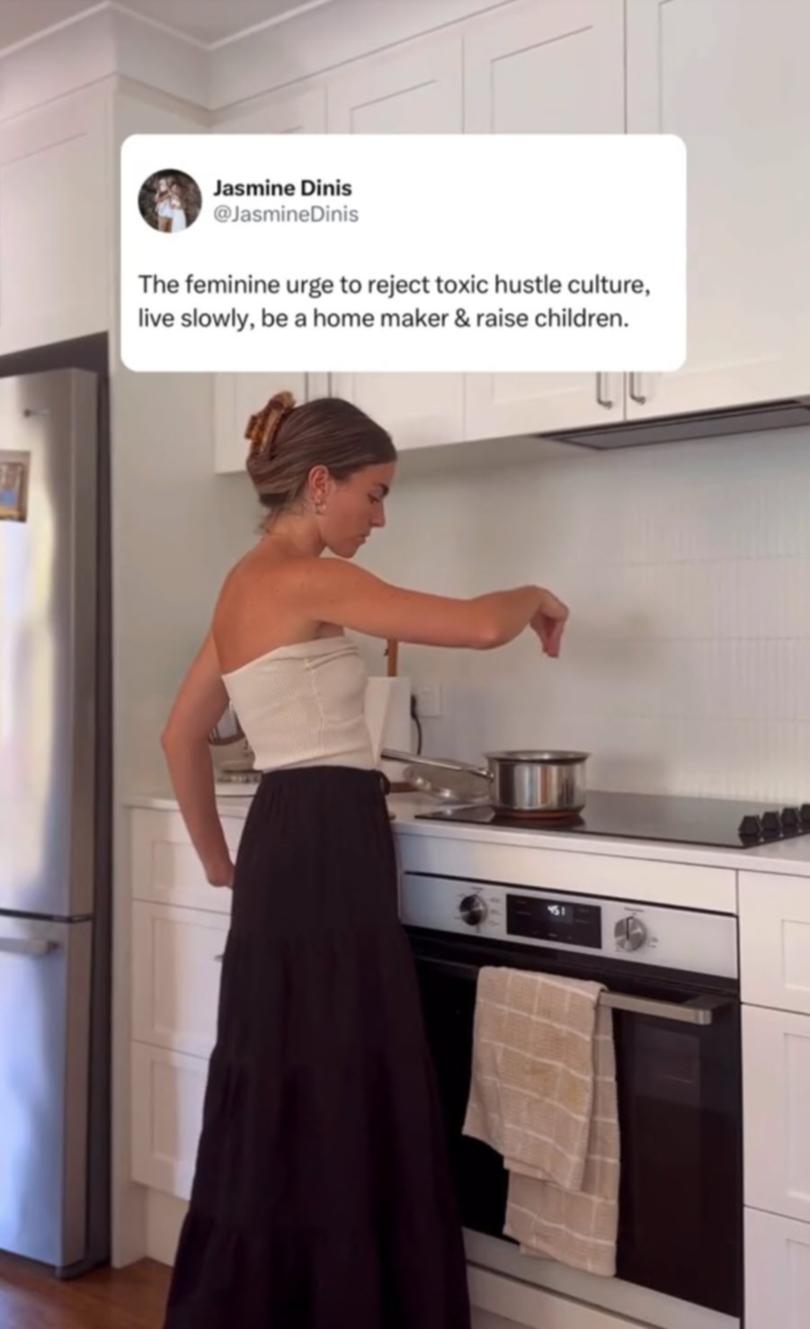
But are they bad?
There are two main criticisms levelled at tradwives.
The first is that they are fake.
Nobody embodies this better than Ms Nelleman, with her family money and pricey stove at odds with the veneer of a simple life presented onscreen.
It’s not just her. The reality is that, while tradwives might act like they are living in the 1950s for as long as it takes them to film a video, they’re digital content creators whose job just happens to be pretending not to have one.
It’s up for debate whether this kind of social media performance is any better or worse than the average influencer, who also package and sell idealised versions of their lives, or even the average social media user who chooses the most flattering selfie to share online and bins the rest.
Some tradwives seem to be in on the joke, treating it more like performance art to pay the bills than a lifestyle they embrace 24/7.
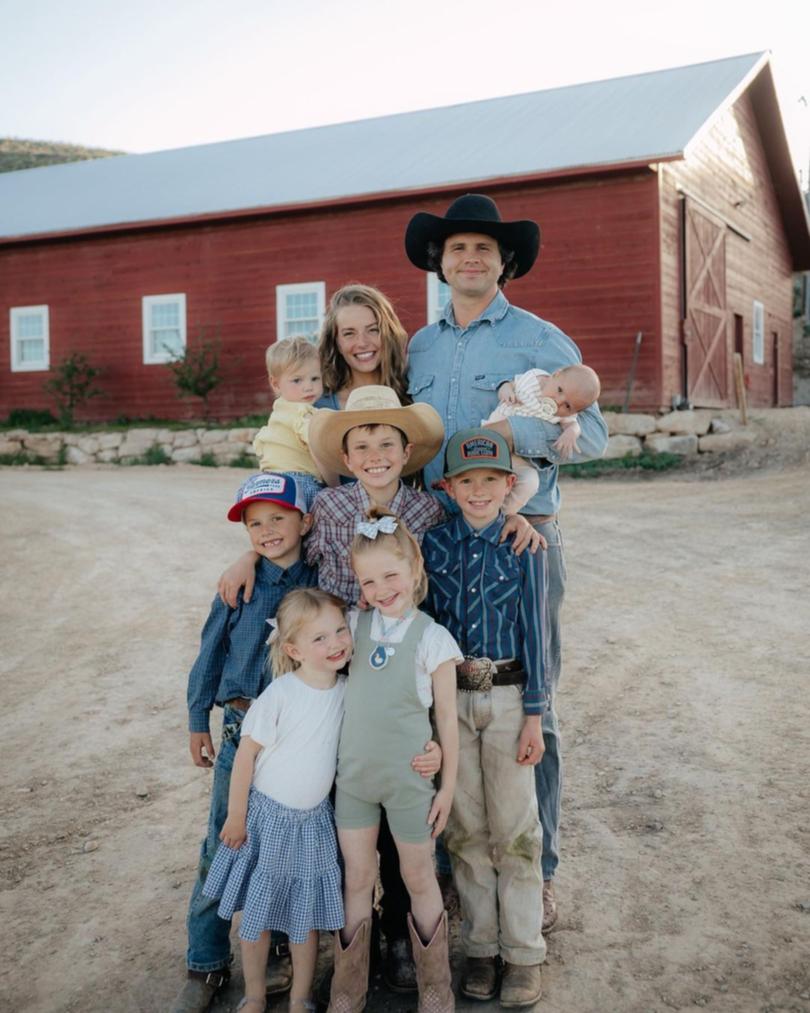
The more serious accusation levelled against tradwives is that they are a product of the alt-right, using lipstick and baked goods to spread anti-feminist and anti-women messages, attacking everything from birth control to mainstream medicine.
Writing on The Conversation website, Charles Sturt University academics Kristy Campion, a senior lecturer in terrorism studies, and Kiriloi M Ingram, a postdoctoral research fellow, said there was a small subculture of tradwives who used their platforms “to promote the dark ideas of the far right”.
“The number of tradwives aligned with the far right may be small, but their popularity on social media platforms suggests their cohort is growing,” they wrote. “And we know from our research that far-right tradwives are active in Australia, on places such as X and Tik Tok, Instagram and YouTube.
“Our research shows far-right tradwives believe their roles as mothers and wives guarantee the survival of the white race, while actively weakening enemies. In an effort to encourage men to the cause, some tradwives claim they embraced their ‘true’ femininity only after they were protected by a ‘real man’ who embodies the (toxic) masculine ideals of the far right.
“The exploitation of ‘traditional’ gender identities to promote far-right ideas is dangerous. It makes women’s subordination to men seem legitimate – and even natural – and justifies violence when this natural order is disrupted.”
They said such far-right women tend to oppose divorce, birth control and women in the workplace.
“Our research shows some even argue rape does not exist in marriage,” they wrote.
Extremism researcher Julia Ebner has gone undercover with jihadists and white nationalists. She also did a stint infiltrating the extreme fringe of the tradwife movement.
“This is now my third week talking to the Trad Wives and I have started to get used to their endorsement of openly misogynist statements,” she wrote of her experiences in an article for Primer.
“’Women’s highest value to men is her sexual value, and she’s most valuable when she’s in her sexually pristine state,’ I am repeatedly told.”
Ebner sees the tradwife movement as an extension of the manosphere, an unofficial collection of website, forums and podcasts that promote misogyny, toxic masculinity and oppose feminism.
“I was convinced this was an almost exclusively male phenomenon, but the more time I spend with Red Pill Women, the more I understand that anti-feminist movements aren’t just made up of men,” Ebner wrote.
“Female men’s rights activists who want a return to traditional power roles and exaggerated notions of masculinity and femininity have adopted the rhetoric of the Manosphere… confusion about changing notions of masculinity and femininity has pushed men and women into fundamental identity crises. ‘Everything you had been taught and told was based on a lie,’ one TradWife tells me. ‘The lie that you can have everything, self-fulfilment, and a happy family life. It just doesn’t work that way’.
“No wonder the idea of going back to old-fashioned gender roles can be appealing to men as well as to women. Was it all easier back then? With well-defined roles and behaviours on both sides?”
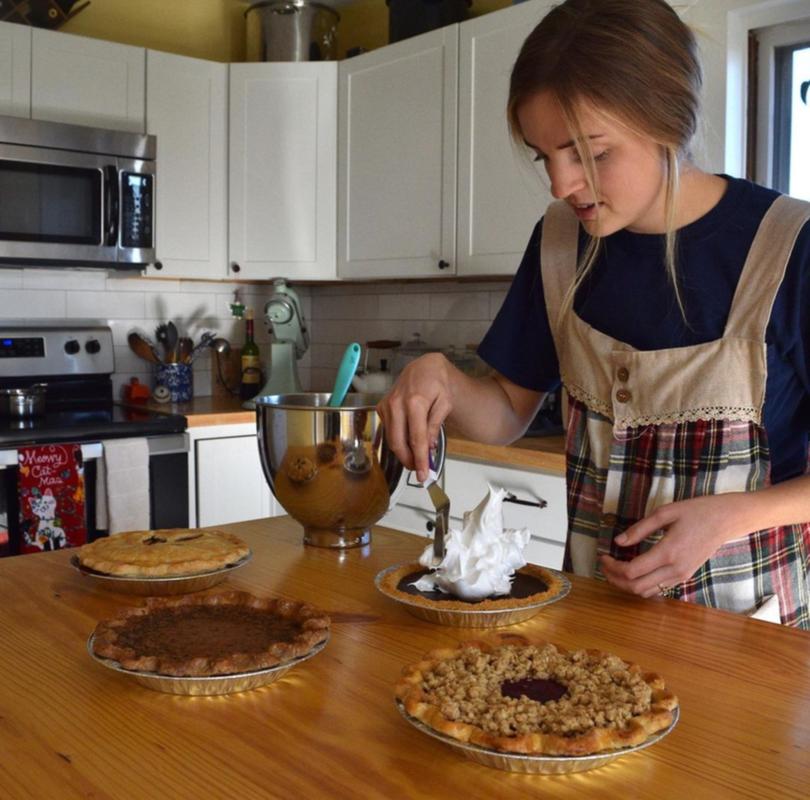
In defence of tradwives
Not all tradwives embrace religion and conservative politics.
Ms Smith tackled criticism of her lifestyle in a recent video.
“I’ve always wanted to be a young mum because growing up, my dad would always tell us that he regrets having kids later in life,” she said. “So I took that advice and it’s one of the best decisions I could have made, and I know it’s not for everyone.
She said she was not a hardcore Mormon trying to “spread Mormon propaganda” but was, with her husband, still “figuring out how we want to raise our kids”.
And not everyone who looks like a tradwife feels comfortable embracing the label.
Michigan influencer Beth Gantz, whose homestead life and rustic vibes exude tradwife energy, recently told The Cut she did not identify with the label.
In Ms Gantz’s most famous Instagram video, she poses the question: “How I quit my job to homestead full time”. Her blunt answer — “generational wealth”, “white privilege” and “farming on stolen land” — did not exactly scream #tradwife.
“A lot of these homesteading skills are actually rooted in people who were in poverty,” she told The Cut website. “People turned to these things out of necessity. To do things in the most expensive and beautiful way possible just feels super icky to me.
“And if you think about it politically, a lot of conservative values don’t align with the things I associate with homesteading — stewardship of the earth, taking care of people who are less fortunate than you.”
Originally published on The Nightly
